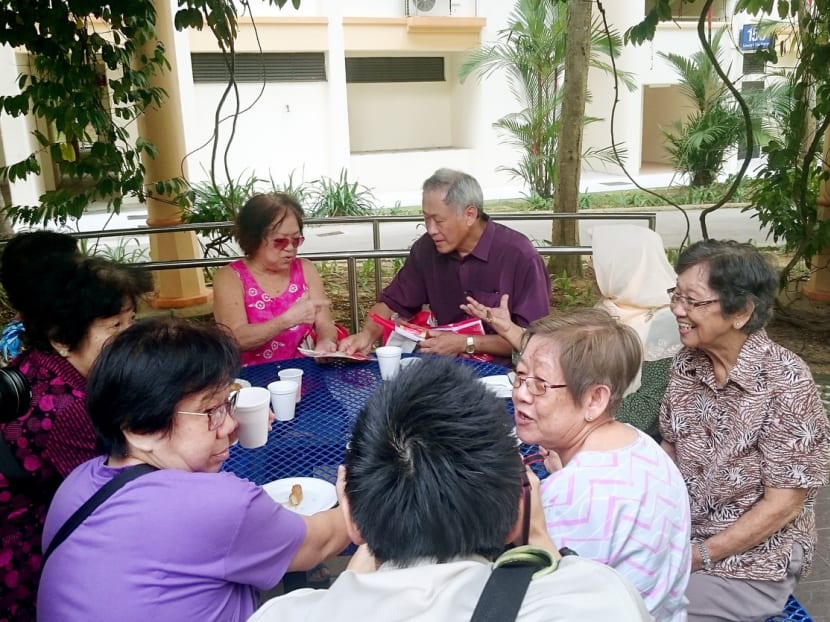Party comments over weekend telegraph their agendas, say analysts
SINGAPORE — It may still be early days yet, with the next General Election (GE) weeks or months away, but the messages from the main political parties at the weekend — right after the electoral boundaries report was released on Friday — have been telling, in terms of the agendas of the various parties, analysts said yesterday.

The PAP’s organising secretary Ng Eng Hen during a walkabout on Sunday. Dr Ng has called for fewer personal attacks and more serious debate during the campaigning period. Photo: Kelly Ng
SINGAPORE — It may still be early days yet, with the next General Election (GE) weeks or months away, but the messages from the main political parties at the weekend — right after the electoral boundaries report was released on Friday — have been telling, in terms of the agendas of the various parties, analysts said yesterday.
The People’s Action Party (PAP) has framed the GE in terms of leadership renewal, and would bank on its track record as it seeks a strong mandate to take the country forward in uncertain times, they added. The Workers’ Party (WP), on the other hand, could point to policy shifts in recent years — when it occupied seven of 87 parliamentary seats — as argument for a need for greater checks and balances.
Compared with the previous GE, the analysts also noted that social media would most likely play a bigger role this time round, partly due to the proliferation of sociopolitical websites.
Dr Carol Soon, a research fellow at the Institute of Policy Studies (IPS), said: “Digital technologies have levelled the playing field for both the PAP and the opposition parties, in terms of publicising their party platforms and promoting their candidates. Leveraging the instant reach of social media and avoiding the pitfalls, such as how not to let political gaffes become viral content, would be a common challenge (for the parties).”
Still, Singapore Management University law don Eugene Tan did not think social media would be a game changer. Referring to sociopolitical websites, he said: “For them to be any use, they must reach out to voters who would otherwise not go to their site, and having reached out, can they persuade them to consider other political options? Otherwise, each site will continue to attract its own. It’s a self-selecting readership.”
On Sunday, the PAP’s organising secretary Ng Eng Hen called for fewer personal attacks and more serious debate during the campaigning period, and described the coming GE as a watershed, given that it would, for the first time, be held without founding Prime Minister Lee Kuan Yew, who died in March.
The analysts said the PAP was quick to claim the moral high ground in anticipation of negative campaigns from opposition parties. They added that the reference to Mr Lee was an indication that his legacy and that of other PAP pioneers could be evoked in an election year that marks the 50th anniversary of Singapore’s independence, and the PAP could also tie this in with the leadership renewal theme that Prime Minister Lee Hsien Loong had highlighted in May as the most important issue in the GE.
Associate Professor Tan said: “(The PAP) would certainly want to try to draw the link between where Singapore is today (and) the PAP’s leadership and governance since 1959.”
On the SG50 celebrations, Dr Gillian Koh, a senior research fellow at IPS, said it was possible that “the social dynamics of celebrating a Golden Jubilee and holding a GE can pull in different directions”.
“With the GE looming, it will no longer just be a celebration of how far we have come, but probably a more sobering, politicised reckoning about that record. Some will highlight the price they paid, things or people they feel have been neglected or missteps or opportunities missed, and try to make political capital of these,” she said.
On its part, the WP, in a departure from tradition, made known the 28 seats it would be contesting out of the 89 in total — an implicit warning to other opposition parties to keep their hands off. But more importantly, it signals to the voters that the party is working on incremental change instead of trying to take over the Government, the analysts added.
National University of Singapore political scientist Bilveer Singh said: “The message is: Look, we are a responsible party ... (We’re) not a threat to the ruling party, but we want it to be a better and more responsive party.”
Assoc Prof Tan added that it was the WP’s assurance to voters that “even if you elect all 28 WP candidates, the PAP is still going to be in charge, as the WP is not even at the one-third threshold that would enable it to block constitutional changes”.
The analysts also noted that the WP was likely to ditch its 2011 GE slogan, Towards a First World Parliament, given the mixed performance of its Members of Parliament in the august chamber, and would again try to maximise its appeal in the heartlands. In any case, political parties tend to avoid reusing slogans, so as to reflect a forward-looking agenda, Assoc Prof Tan said.
The WP has come under sharp criticism in Parliament over its management of the finances of the Aljunied-Hougang-Punggol East Town Council. But the analysts thought it was unlikely that the PAP would zoom in on this during the hustings. In fact, other opposition parties may bring up the issue so as to set themselves apart from the WP, they said.






